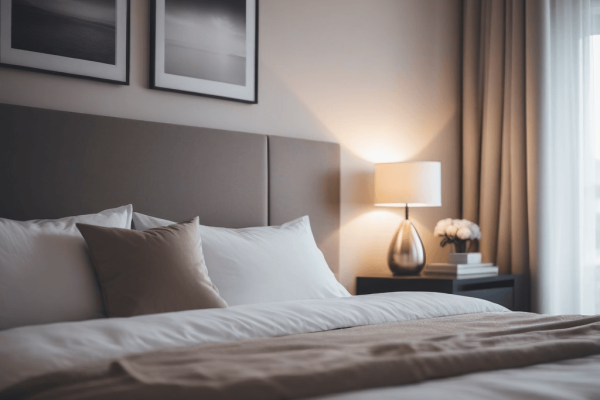Evenings are a time to unwind, recharge, and prepare for the day ahead. However, for many people, evenings can feel rushed, filled with tasks, or bogged down by lingering stress from the day. Creating a stress-free evening routine using minimalist principles allows you to relax, clear your mind, and end the day with intention. By simplifying your evening habits, you can foster a peaceful environment that leads to better rest and a more productive start to the next day.
In this article, we’ll explore minimalist habits and strategies to help you create a calming and effective evening routine.
1. Declutter Your Space Before Winding Down
A tidy environment helps you feel more relaxed, creating a peaceful atmosphere to unwind. Cluttered spaces can contribute to stress, making it harder to relax in the evening. A quick declutter can make a big difference in creating a stress-free environment before you settle in for the night.
How to Declutter Efficiently Each Evening:
- Start Small: Dedicate just 5–10 minutes to tidying up key areas, such as the living room, kitchen, or bedroom. Focus on clearing away items that don’t belong, like dishes, shoes, or mail.
- Focus on High-Impact Areas: Tidy spaces that you see most often in the evening, like the couch or your bedside table. A clear space promotes calm, helping you feel more relaxed.
- Adopt a “One In, One Out” Mindset: As part of your daily routine, try removing one item for every new item you bring into your space. This keeps clutter at bay and promotes minimalism over time.
Pro Tip: Keep a small basket in a common area to collect items throughout the day. You can sort and return them to their proper places at the end of the day, keeping your space consistently clutter-free.
2. Disconnect from Technology
Digital devices can be a major source of stress, especially when used right before bed. The blue light emitted from screens can interfere with melatonin production, making it harder to fall asleep. Additionally, constant notifications can stimulate your mind, preventing you from fully winding down.
Steps to Disconnect Before Bed:
- Set a Device Curfew: Aim to turn off your devices at least 30–60 minutes before bed. This gives your mind time to transition away from work, news, and social media.
- Create a Charging Station Outside the Bedroom: Designate a charging spot outside of your bedroom to help reinforce your device-free evening habit. This minimizes the temptation to check your phone late at night.
- Switch to Do Not Disturb Mode: If you must keep your phone nearby, set it to Do Not Disturb. This way, you won’t be disturbed by notifications that could keep you up.
Pro Tip: Replace screen time with relaxing activities like reading a book, journaling, or practicing meditation to help you wind down peacefully.
3. Practice a Simple Self-Care Routine
A minimalist approach to self-care focuses on just a few essential habits that help you unwind and prepare for restful sleep. By simplifying your self-care routine, you can avoid feeling overwhelmed or rushed.
Creating a Minimalist Self-Care Routine:
- Focus on Skin and Relaxation: A basic skincare routine, such as cleansing and moisturizing, is a simple yet effective way to refresh and rejuvenate before bed. Consider adding a calming practice like applying a lavender-scented lotion to promote relaxation.
- Incorporate Stretching or Light Yoga: Gentle stretching or a few yoga poses can help release tension from the day and relax your muscles, preparing you for a restful night.
- Try Deep Breathing: Spend a few minutes practicing deep breathing exercises. Slow, mindful breaths help you calm down and transition into a more relaxed state.
Pro Tip: Keep self-care supplies, like skincare items or a yoga mat, organized and easy to access. This keeps your routine stress-free and minimizes the time spent searching for what you need.
4. Reflect with Gratitude or Journaling
Journaling or practicing gratitude is an excellent way to clear your mind and bring closure to the day. By setting aside time to reflect, you can process your thoughts, let go of stress, and focus on the positive aspects of your day.
Simple Reflection Practices for a Stress-Free Evening:
- Write Down Three Positive Moments: Reflect on three things that went well during your day. This could be an accomplishment, a kind gesture, or a moment of joy. This practice encourages a positive mindset before bed.
- Set Your Intentions for Tomorrow: Consider writing down one or two goals for the next day. This helps you feel prepared, prevents worrying about tomorrow, and allows you to let go of today’s stress.
- Keep It Short and Simple: Your journaling doesn’t have to be lengthy. Just jotting down a few thoughts or things you’re grateful for is enough to help you unwind.
Pro Tip: Keep a small journal and pen on your nightstand, making it easy to reflect for a few minutes before bed without needing to look for supplies.
5. Prepare Your Space for the Morning
A minimalist evening routine focuses not only on ending the day but also on preparing for the next. Setting up your space and preparing essentials for the morning helps reduce stress and saves you time when you wake up.
How to Prepare for a Stress-Free Morning:
- Set Out Tomorrow’s Clothes: Choosing your outfit the night before eliminates a decision from your morning, making it easier to get ready.
- Prepare Your Breakfast or Coffee: If you like to start your day with a specific breakfast or drink, prep it the night before. You can set up the coffee machine or prepare overnight oats for a quick morning meal.
- Tidy Your Bedroom: Make sure your bedroom is clutter-free before you go to bed. A clear, calming space makes it easier to wake up refreshed.
Pro Tip: Adopt a few morning-prep habits that work best for your lifestyle. These small tasks take only a few minutes but can make a big difference in creating a smooth start to your day.
6. Embrace a Consistent Bedtime
A consistent sleep schedule is one of the most impactful habits for a stress-free evening routine. Going to bed and waking up at the same time each day helps regulate your body’s internal clock, making it easier to fall asleep and wake up feeling refreshed.
Benefits of a Regular Bedtime:
- Improves Sleep Quality: A consistent bedtime helps you reach deeper sleep cycles, resulting in better quality rest.
- Reduces Morning Grogginess: Your body adjusts to a steady schedule, making it easier to wake up without feeling groggy.
- Supports Overall Health: Quality sleep is essential for physical and mental well-being, impacting everything from mood to immune function.
Pro Tip: Create a wind-down routine that signals to your body it’s time for bed, such as dimming the lights, stretching, or listening to calming music.
7. Limit Decision-Making in the Evening
Decision fatigue can add unnecessary stress to your evening. By minimizing the number of choices you need to make at night, you can enjoy a more peaceful end to the day.
Ways to Limit Decisions at Night:
- Create a Simple Dinner Routine: Plan a few go-to meals that you can rotate during the week, so you don’t have to decide on dinner every evening. Consider meal prepping to make weeknights even easier.
- Establish a Relaxing Activity: Choose a relaxing activity you can enjoy every evening, like reading, stretching, or listening to music. Keeping it consistent prevents you from spending time deciding how to unwind.
- Set a Pre-Bed Checklist: Write a short checklist of tasks to complete each night (like tidying up, journaling, or setting out clothes). This routine becomes automatic, reducing the mental load.
Pro Tip: Embrace simplicity by choosing a few enjoyable activities and routines. Limiting options makes your evenings predictable and peaceful.
8. Keep Evening Lighting Soft and Calming
Lighting plays a crucial role in creating a calming atmosphere and signaling to your brain that it’s time to wind down. Bright or harsh lighting can make it harder to relax, while softer lighting encourages a sense of calm.
Creating Calming Lighting for Your Evening Routine:
- Use Warm Lights: Switch to warm, soft light bulbs that mimic natural evening light, creating a cozy atmosphere that encourages relaxation.
- Try a Dimmer Switch or Lamps: If possible, use dimmable lights or lamps in the evening to keep the lighting low. Floor or table lamps can create a softer, more focused light than overhead lights.
- Avoid Blue Light from Screens: Blue light from phones, computers, and TVs can interfere with sleep quality. Limit screen time and, if needed, use blue light filters.
Pro Tip: Consider using candles or a salt lamp in the evening for a warm, calming glow. This natural light is ideal for winding down before bed.
Conclusion
Creating a stress-free evening routine with minimalist habits transforms your evenings into a time of calm and relaxation. By simplifying your space, disconnecting from technology, and embracing consistent habits, you foster an environment that prepares you for restful sleep and a productive start to the next day. With a few intentional adjustments, you can design an evening routine that aligns with your lifestyle, reduces stress, and brings peace to the end of each day. Remember, a minimalist approach isn’t about doing less—it’s about focusing on what matters most to create a truly restorative and fulfilling evening.


